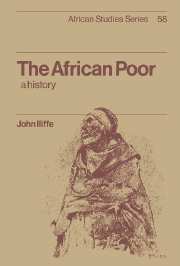Book contents
- Frontmatter
- Contents
- Preface
- 1 The comparative history of the poor
- 2 Christian Ethiopia
- 3 The Islamic tradition
- 4 Poverty and power
- 5 Poverty and pastoralism
- 6 Yoruba and Igbo
- 7 Early European initiatives
- 8 Poverty in South Africa, 1886–1948
- 9 Rural poverty in colonial Africa
- 10 Urban poverty in tropical Africa
- 11 The care of the poor in colonial Africa
- 12 Leprosy
- 13 The growth of poverty in independent Africa
- 14 The transformation of poverty in southern Africa
- Notes
- Bibliography
- Index
11 - The care of the poor in colonial Africa
Published online by Cambridge University Press: 31 October 2009
- Frontmatter
- Contents
- Preface
- 1 The comparative history of the poor
- 2 Christian Ethiopia
- 3 The Islamic tradition
- 4 Poverty and power
- 5 Poverty and pastoralism
- 6 Yoruba and Igbo
- 7 Early European initiatives
- 8 Poverty in South Africa, 1886–1948
- 9 Rural poverty in colonial Africa
- 10 Urban poverty in tropical Africa
- 11 The care of the poor in colonial Africa
- 12 Leprosy
- 13 The growth of poverty in independent Africa
- 14 The transformation of poverty in southern Africa
- Notes
- Bibliography
- Index
Summary
Previous chapters have identified the poor of colonial Africa and described their efforts to survive. This chapter is about the provision made for them by others. Much of it is about institutions. Because these were rare in precolonial Africa, the institutions created to assist the poor during the colonial period generally embodied the traditions, preconceptions, concerns, and circumstances of the foreigners who devised them. They were therefore diverse: independent Africa was to inherit a welfare system of baffling fragmentation and complexity. Partly for that reason, but more because the needy were so numerous, institutions cared for only a minority of poor Africans. Most continued to survive either by the care of their families or by their own efforts.
Victorian Lagos displayed the personalised nature of provision for the poor in early colonial Africa. The provision was made chiefly by Africans. The main benefactors were probably wealthy patrons who adhered to Yoruba religion – as did 74 per cent of the population in 1871 – and practised largess according to a code in which honour accrued from generosity either to the poor or to the community at large. This is speculation, however, for such largess left no evidence except echoes in the behaviour of Christian and Muslim notables. Chief Taiwo, for example, was a trader and early Christian ‘noted for his readiness always to help those who appealed to him, and he was instrumental in relieving many from difficulties, and his house became a sort of house of refuge for natives of the Hinterland in distress … Chief Taiwo was a true type of the African “big man”.’
- Type
- Chapter
- Information
- The African PoorA History, pp. 193 - 213Publisher: Cambridge University PressPrint publication year: 1987
- 1
- Cited by

